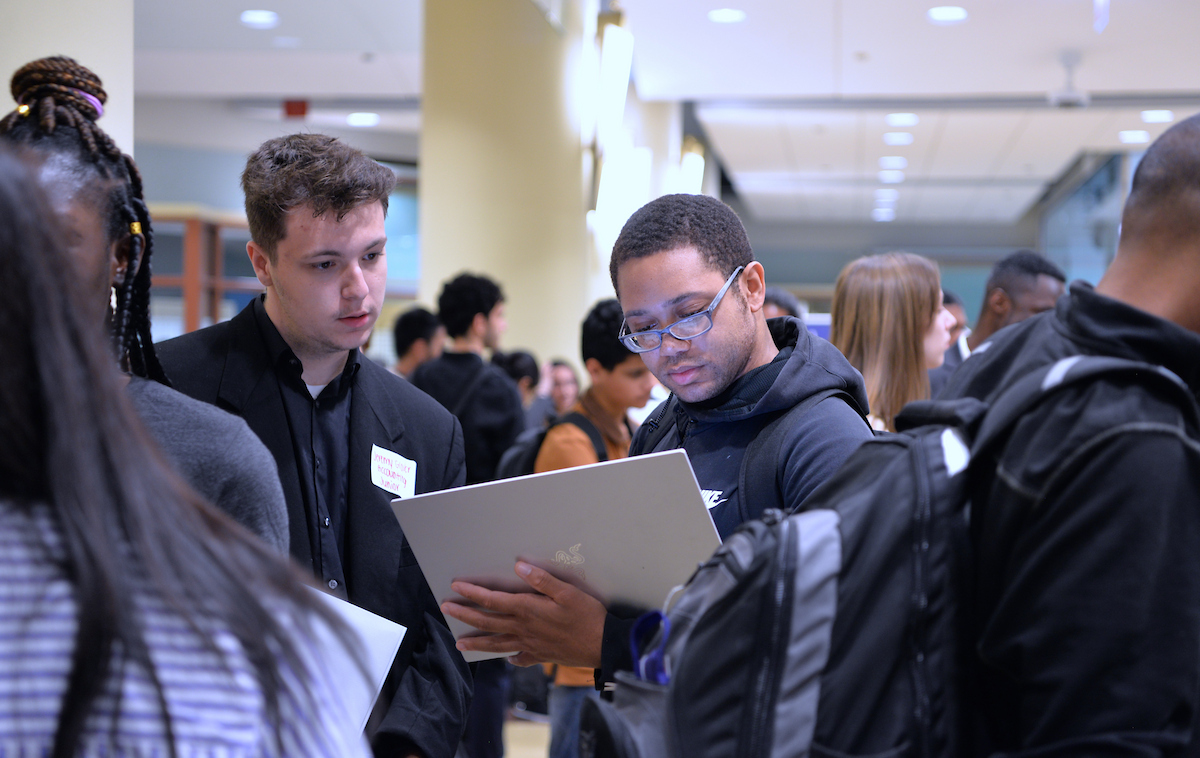
Students network at Meet the Firms, a biannual job fair held by the School of Accountancy and MIS that brings dozens of employers to campus.The tax profession is changing. DePaul’s graduate offerings are changing with it. DePaul’s Master’s of Science in Taxation (MST) program is now the Master’s of Science in Taxation and Analytics (MSTA).
The expansion of this over 50-year-old program is a direct response to the evolving needs of the tax industry.
Having a deep understanding of the various facets of taxation will remain essential for professionals starting or elevating their careers in tax, said Kent Klaus, director of the MSTA.
However, there are increasing demands on tax pros to pair their expertise with analytical and technological savvy.
That intersection of skills, Klaus said, will equip MSTA graduates to add even more value to their employers and clients and connect their work to the overall business strategy of these firms.
“In recent years, we have heard from the profession that tax planning must consider all available data that might impact business and investment decisions,” he said. “The MSTA program provides students with the skills to do so.”
A changing industry founded on fundamentals
The tax industry is many-layered. It impacts every dimension of business and individual decision making. It’s shaped not just by the law but by policymakers, courts, and government agencies at all levels – federal, state, and local.
Bill Zink is a DePaul alumnus and a longtime instructor in the MST program. Over his 46 years in public accounting, he’s seen technology transform the profession.
Zink sees AI and other emerging technology as a potential next step in that progression.
“What I think AI might eventually do,” Zink speculated, “is produce quicker research, better research. It might play a bigger role in producing the results: in figuring out what’s relevant and what’s not.”
In this context, Zink stressed, it will be more important than ever for professionals to exercise judgement in how they interpret AI’s output. The MSTA will give students the skills to do just that.
A direct connection to industry
Technology is one new focus of the program. Data analytics is another.
Increasingly, firms are seeking tax pros with the analytical skills to translate their specialized knowledge into strategic insights.
Understanding data — how to find it, analyze it, and present it — “will empower tax professionals to elevate their work into strategic value drivers for the clients and businesses they serve,” said Anna Wojtowicz.
A senior manager with Grant Thornton’s Tax Digital Consulting practice, Wojtowicz designed a new class on data analysis for the MSTA, which she teaches.
Indeed, courses in the MSTA have long been taught by practicing experts in the field, creating a direct line between the classroom and the needs of the tax industry. The changes to the program build on that legacy.
Another MSTA instructor, Damien Martin, is a tax partner with Ernst Young and a frequent speaker on changes to the tax profession.
His class, Martin said, will “help tax professionals take their research and related skills to the next level using AI and other available tax technology.”
Staying true to the program’s history
Overall, students will be able to take up to six of the program’s 12 required courses with a deep focus on data analytics and technology.
The reimagined program comes with other changes. Students will have more options to attend class in person, with a number of courses offered in flex mode. Starting this Fall, the program will be STEM-designated.
Other elements of the program are time-tested from its 50-year history as an MS in Taxation.
For current MST student Michael Zamudio, a defining characteristic of the program is the way it’s opened his eyes to the possibilities in the field. Many of his peers are current tax practitioners located around the country. His professors include current practitioners working not just as CPAs or advisors, but as attorneys and more.
“Tax is so much bigger and there are so many more options than you would think,” he said. “I feel like, since I started this program, I’ve never stopped learning.”
According to Hui Lin, Director of the School of Accountancy and MIS, those kinds of connections are foundational to the program’s past and critical components of its future.
“Since we launched the MST program more than 50 years ago, we have remained committed to ensuring the curriculum evolves in step with the changing needs of the tax profession,” she said. “The MSTA program continues our longstanding tradition of equipping tax professionals with the knowledge and skills essential for sustained success in their careers.”
---
The full curriculum can be found here: https://catalog.depaul.edu/programs/taxation-and-analytics-online-ms/.